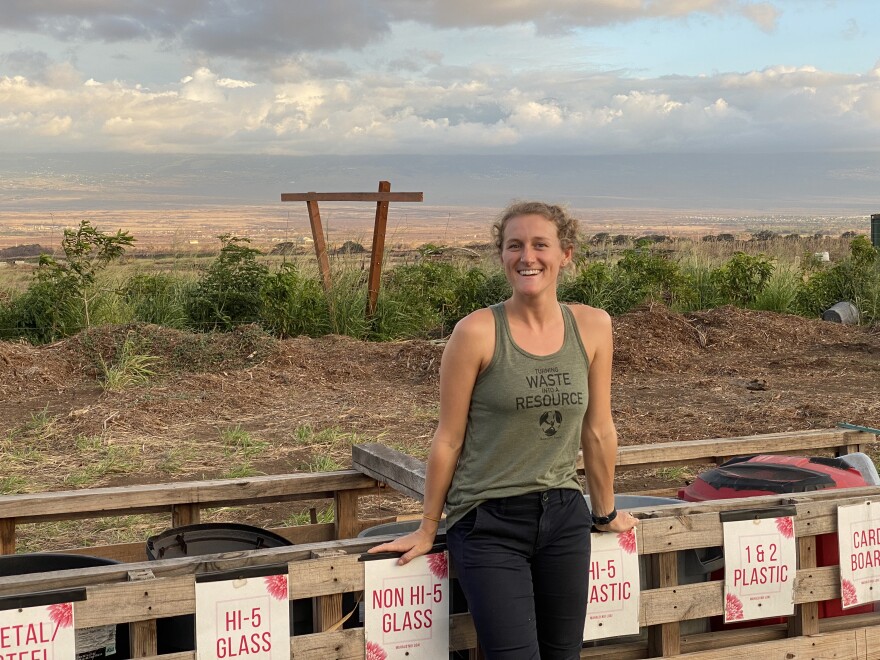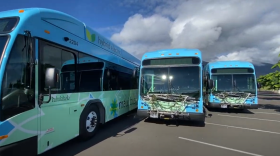Organizations such as the Surfrider Foundation and Sierra Club are active in addressing broad environmental issues at the local level, including on Maui. But one island company and a homegrown community group are developing ways to recycle and reduce waste that could be adopted beyond the county.
Reusing Construction, Demolition Waste
Hawai?i Materials Recycling LLC is located on a 10-acre parcel next to Pi?ilani Highway in K?hei. The company started in 2018, two years after the privately-owned construction and demolition waste landfill in M??alaea closed.
The county began accepting construction and demolition waste at the Central Maui Sanitary Landfill shortly after the closure. Debris of this type makes up 14% of the waste now going into the Central Maui Sanitary Landfill.
Hawai?i Materials Recycling co-owner Pete Sullivan says the company takes certain types of inert construction waste, such as rock, concrete and asphalt, and crushes it to create new products like road base material that can be sold to contractors.
"All of this stuff that you see had the potential to basically go one of three places," Sullivan said on a recent tour of his operation. "It could go to another construction site, if someone had it to go to, it could go to the landfill or it could be fugitively dumped. And that's very common here."
Sullivan's company allows contractors to drop off materials from their projects, and pick up new products in one round trip.
"For the consumer, it just saves them tens of millions of dollars," he said. "This is avoided either in building a landfill cost, in trucking, in road wear and tear. It's fuel, it's emissions, it's the whole bit."
Sullivan says he got the idea to reuse demolition and construction debris 30 years ago while working as a contractor. He made it his goal to use the material that was already on-site for his projects. Sullivan's contracting company then bought a mobile machine to crush the materials. That would go on to save the company money and resources.
But since opening, Sullivan says it's been difficult to get the word out about his company and the benefits of diverting inert construction and demolition waste from the landfill.
In the end, he says, the work is still worthwhile -- even if the company doesn't make a lot of money.
"There's a lot of reasons besides looking at the balance sheet and the income statement to say that this is a good business. It's also doing a lot of good for the community."

Educating Kids, Adults How To Reduce Waste
The nonprofit Maui Huliau Foundation is not only educating the youth of Maui about the environmnent, but also teaching adults how to reduce waste the right way.
The foundation was founded in 2010 as a filmmaking club to teach Maui County youth about the environment. Three years ago, it started a waste diversion program called Green Events. The program works with organizers of conferences and other events to reduce their waste.
"We do this by diverting as much of the waste from the landfill as possible," said the foundation's program director, Kiera Ryon. "And we can do this through reusing things like cups, utensils, even reusing plates."
Ryon says the program has an average diversion rate of 80%, meaning 80% of the waste produced at the events does not end up in the landfill. A majority of the waste is recycled, reused or composted.
"The main purpose of this program is to help the community, help the businesses, help individuals see waste as a resource rather than as waste," she said.
"Our goal is to educate. So in hopes that we keep doing these events, we get people adjusted and used to the process of diverting their waste from the landfill. And, therefore, eventually this is just going to be the norm."
Ryon says the foundation is in the very early stages of developing a new program, one that partners with local schools to teach students how to separate and reduce their trash. The hope is to educate the next generation about the advantages of both recycling and cutting down on waste.
This story is part of our series, "Trashing The Islands," an examination of our waste practices statewide. We'd like to hear your comments and questions about our trash issues. Call us on our Talk Back line at (808) 792-8217 and leave your comment, name and phone number. You can also email us at news@hawaiipublicradio.org, tweet us @wearehpr or comment on our Facebook page.




